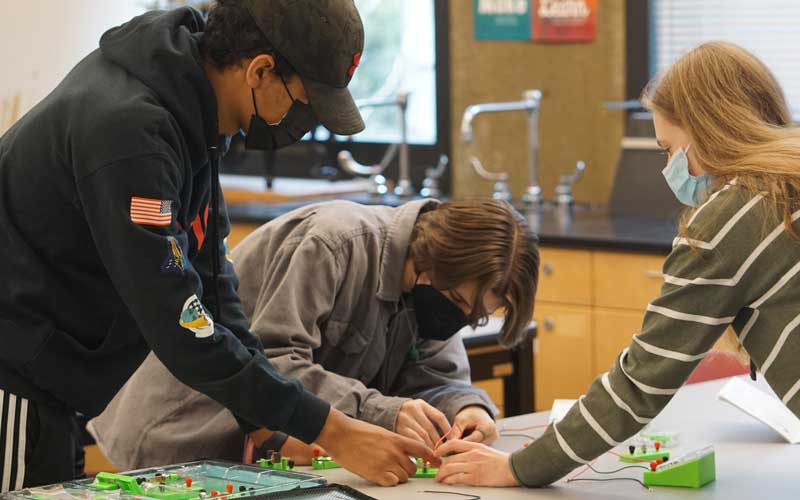Courses and Degree Planning
 We want you to succeed! As such please do e-mail us at physics@highline.edu if you have any questions, need help finding an advisor, or even if you are not sure about whether you want to pursue physics or astronomy. If you are interested in Astronomy, you will still need to complete a physics AS degree and when you transfer, you can choose to obtain a physics BS with specialization in astronomy or a BS in astronomy specifically. Either one allows you to pursue careers in astronomy with physics being considered more generally applicable.
We want you to succeed! As such please do e-mail us at physics@highline.edu if you have any questions, need help finding an advisor, or even if you are not sure about whether you want to pursue physics or astronomy. If you are interested in Astronomy, you will still need to complete a physics AS degree and when you transfer, you can choose to obtain a physics BS with specialization in astronomy or a BS in astronomy specifically. Either one allows you to pursue careers in astronomy with physics being considered more generally applicable.
Below is some key information but remember that your educational path is unique to you. Seek out a faculty advisor as soon as you can so you have someone who can support you on your journey.
The Most Important Step: Request a Faculty Advisor
Faculty advisors can help you with:
- Planning Classes
- Career advice
- Choosing a specific engineering discipline
- Transfer university choices
- Transfer university applications
- Looking for scholarships and internships
- Finding campus resources
- Overcoming obstacles
- Being a source of support and encouragement
You should meet with your faculty advisor every quarter so that you can make sure you are on track for your degree, and you get the information and resources you need to succeed. Do not try to go it alone!
To request a faculty advisor, fill in this form: Faculty Advisor Request Form
Important Tips for Ensuring You Succeed
- Start taking math as soon as possible. To get your math placement please go to the Placement and Testing Center and speak to an entry advisor by emailing entryadvising@highline.edu
- Math is a prerequisite for all science classes.
- To graduate on time you need to take math every quarter.
- Please do not drop/withdraw from a math class without talking to your instructor.
- Take series courses at one institution (eg. take the entire physics series at Highline College to ensure that it transfers). Some schools do not accept part of a series upon transferring.
- Take series courses back-to-back. Try not to take a quarter off in between series classes so that the material taught in the previous class in the series is more fresh in your mind and easier to remember while you are taking the next class in the series.
- Not all classes are offered every quarter so it is really important to meet with an advisor to develop an academic plan.
AS in Physics Requirements
The AS in Physics degree is one of many Associate of Science (AS-T Track II) offered at Highline. AS classes are designed to meet requirements for your Bachelors degree and for most institutions in Washington should give you junior level standing when you transfer.
- Completion of a minimum of 90 college-level credits (courses numbered 100 or above);
- A minimum 2.0 cumulative college-level GPA;
- Completion of at least 23 of the total required credits at Highline with a minimum 2.0 GPA (known as the residency credit requirement).
In addition to the general requirements for all degrees, the AS degree specifically requires the following:
- Approval of a faculty adviser must be obtained for completion of this degree;
- A maximum of five quarter credits of traditionally nontransferable restricted (often called “Gray Area”) college-level courses will be accepted in the Remaining Credits category. (See AA Option A, elective requirement section)
- At least one sequence course – e.g., the three-quarter physics sequence – should be completed at Highline College.
- ENGL& 101 – English Composition I (F,W,S,Su)
The Distribution requirement attempts to ensure variety and breadth by requiring educational experiences in a number of disciplines, including social science and humanities.
AS degree students must complete a minimum of:
- 5 credits in Humanities;
- 5 credits in Social Sciences;
- 5 credits in either Humanities or Social Sciences.
- Understand the physics of motion, Newton’s laws, conservation of energy and momentum, electricity and magnetism, basic thermodynamics, waves and oscillations.
- Apply algorithmic and symbolic thinking to the problem-solving process.
- Use order of magnitude calculations to understand the scale of phenomena.
- Compare and contrast observations of physical phenomena with expected, theoretical and/or modeled behavior.
- Prepare, logical, well-reasoned, clear and concise lab reports.
- Apply classroom knowledge to private and public discussions of science issues.
- Understand, interpret and assess the value of publicly presented science issues.
AS Physics Requirements
In addition to the above communication and distribution requirements (20 credits), the AS Physics degree requires the following:
Complete the following:
- MATH& 151 – Calculus I (F,W,Sp,Su)
- MATH& 152 – Calculus II (F,W,Sp,Su)
- MATH& 163 – Calculus III (F,W,Sp,Su)
Complete the following:
- CHEM& 161 – General Chemistry with Lab I (F,W,Sp)
- CHEM& 162 – General Chemistry with Lab II (W,S,Su)
- PHYS 201 – Mechanics (F,W)
- PHYS 202 – Electricity and Magnetism (W,Sp)
- PHYS 203 – Waves, Thermodynamics, and Modern Topics (Sp,Su)
- CS& 141 – Computer Science I Java (F,W,Sp,Su)
Complete 25 additional credits (with advisor approval). Recommended courses include:
- MATH 220 – Linear Algebra (W,Sp)
- MATH 230 – Differential Equations (F,W)
- MATH& 264 – Calculus IV (F,Sp)
Other courses can be approved after consultation with an advisor.
Prerequisite courses to the above classes (e.g. CHEM& 121, CHEM& 139, CSCI 132, MATH& 142, PHYS 139) are not included in the requirements, yet they are necessary for taking classes required in the degree.
Program Maps
Important Caveats about Maps
- The following maps assume the student starts attending in the Fall Quarter.
- It is generally advisable for students to complete as much math and prerequisite courses (e.g. MATH&141, MATH&142, PHYS 139, CSCI 132) as possible in their first year, to prepare them for the calculus Physics series (PHYS 201,202,203) during their second year.
- The following maps assume no classes to be taken during Summer Quarter. If a student seeks to take classes during Summer Quarter, it is strongly recommended
Program Maps



